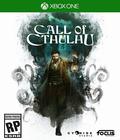Pre-order Call of Cthulhu
In a lot of ways, we're living in the world that H.P. Lovecraft created, and that would terrify him. You can see the footprints of Lovecraft's particular brand of cosmic horror all over the modern video game industry, basically anywhere that you could possibly find it (the next World of Warcraft expansion, for example, is very Baby's First Lovecraft Story), and every so often, somebody decides to go straight back to the source.
The 2018 Call of Cthulhu, which is from Cyanide Studios in France, is an interactive, investigative horror novel — the developers also call it a "narrative investigation RPG" — based specifically on the (in)famous tabletop game that was adapted from Lovecraft's fiction. (I say "infamous" because, well, it's a game that's notorious among hobbyists for having ten thousand ways to kill you. If you make it through an entire session of tabletop Cthulhu and your character is still upright, alive, mostly intact, and sane enough to hold a conversation, that's a win condition.) This is not a story with a happy ending; it's a horror show where a character will be brought face to face with the most terrible, inhuman horrors of the universe, creatures so ancient and alien that humanity has no frame of reference for them whatsoever, and simply knowing that they exist is enough to drive most people insane.
Here, you play as a private investigator named Edward Pierce in 1920s New England. He's come to an isolated island community after being hired to look into a murder on behalf of a grieving family who thinks there's more to the death of their loved one than they're being told. They are, of course, right. You may be able to tell from the name of the game they're in. Whenever a detective in an H.P. Lovecraft-influenced story goes to an isolated island town with hostile locals, it's not a question of whether there are monsters there, but rather, which monsters they are.
Cyanide Studios's designers at E3 2018, Diane Quenet and Romain Wiart, were very clear about how this game is going to go from the outset. No matter what you do, Pierce will end the events of Call of Cthulhu as a madman. What is up to you is how mad he actually is and how much of his free will remains. The ending you get for the story depends on the choices you've made, and whether or not Edward still has a choice in the matter of what ends up happening to him.
The primary influence from the tabletop game comes from the ability to specialize Pierce's skills in several areas, such as observation, picking locks, or psychology. What Pierce can and cannot do will influence how you can get around various obstacles over the course of the game, thus shaping your path through it. An example from the demo involved Pierce's facility for observation letting him find a well-hidden crowbar under a table. Later, when he found the machinery that ran a secret door, he was able to use the crowbar to force open the door rather than having to search the nearby room for the switch to open it. By the same token, if Pierce knows how to pick locks and can pass a relevant skill check, he can enter rooms that he'd otherwise need to find alternate means to access. Your conversational choices can also affect your interactions and relationships with the other major characters in the game, such as a friendly local police officer named Bradley.
Regardless of Pierce's specializations, his detective skills are represented in-game through his ability to visualize the events in a scene by studying a crime scene, which gives you the ability, called Reconstitution Mode, to dig through a re-creation of past events for clues. This can be as subtle as smudges of blood on the floor, leading Pierce to determine the direction in which a wounded man was running. As Pierce's sanity diminishes through continued contact with the horrific entities of the Cthulhu Mythos and the cultists that serve them, his ability to visualize scenes will become "corrupted," leading to more horrific flashbacks.
The final version of Call of Cthulhu is planned to have four endings, determined by Pierce's decisions and relationships with the five other major characters in the game. The developers specifically mentioned during the demo that the ending you get will be a long, involved process going back almost as far as the start of the game, so whatever ending you get for Pierce, it'll be one that you rolled up your sleeves and earned.
More articles about Call of Cthulhu











 Call of Cthulhu is an RPG-investigation game with psychological horror and stealth mechanics, set in a deeply immersive world.
Call of Cthulhu is an RPG-investigation game with psychological horror and stealth mechanics, set in a deeply immersive world.







